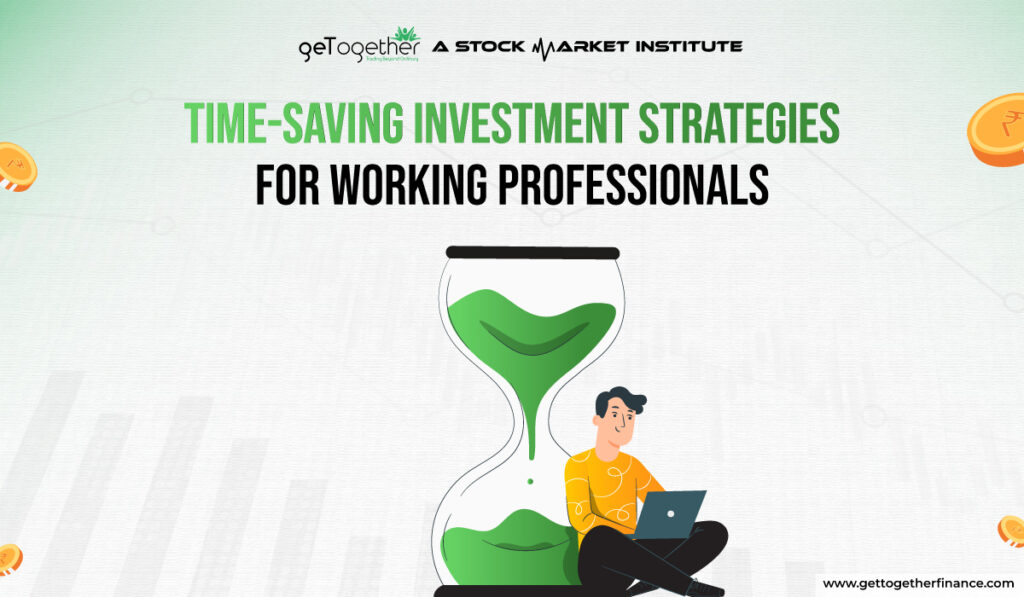Time-Saving Investment Strategies for Working Professionals


Managing investments while simultaneously thriving to make more money can be hectic for working professionals in today’s fast-paced world. But, investing cannot be overlooked because of this, it is an important component of your future planning. That is why, it is important to find time-saving investment strategies that align with the busy schedules of working professionals.
In this blog, we’ll look into professional and effective time-saving investment strategies. Whether you are juggling between hectic working hours, family responsibilities, and or any personal commitment, these strategies are specially curated to streamline the investment process and maximize returns with minimal speculation and effort.
From technology-driven automated investment platforms to easy-to-make and low-maintenance diversified portfolios, We’ll study a number of time-saving investment strategies and options that allow you to grow your money while focusing on your career and personal life. The right approach will easily give you the first hand in managing your investments and making your money work for you, without sacrificing any other professional and personal goals. Let’s dive in and discover how you can make your money work for you, even when time is in short supply.
Table of Contents
ToggleAutomated Trading Process

There are a lot of automated investment platforms commonly known as robo advisors that make investment hassle-free with their advanced time-saving investment strategies. They exceptionally revolutionized the way individuals invest by offering streamlined investment services with the help of advanced technology involving negligible human interaction. Robo-advisor platforms capitalize on market opportunities with the help of algorithms or algo trading techniques aligned with advanced technology to curate and manage diverse and profitable portfolios based on your individual goals, risk tolerance, and time horizon you want for the trade
Robo-advisors offer several benefits in time-saving investment strategies. Firstly, they give the liberty to manage the entire portfolio without getting involved, the technology does its job from portfolio building to profit booking to managing taxes, everything is done. This advanced automation eliminates the need for individuals to regularly monitor the market and make decisions by themselves. It eventually allows professionals to focus on their work, career, and personal lives happily without being in constant worry about their investments.
Why Use Robo Advisors for Investments
Robo-advisors comparatively have lower fees compared to traditional human financial advisors, making them cost-effective options for individuals looking to invest without breaking the bank. Moreover, these platforms often require lower minimum investment amounts, making them accessible to a broader range of investors, including those just starting their investment journey.
When you’re considering taking robo-advisors for your investments, do not forget to compare the features and offerings of different automated investment platforms to find the one that wholly aligns with your investment goals, risk appetite, cost, and preferences. By conducting a thorough comparison, investors can choose a robo-advisor that meets their needs while maximizing the benefits of automated investing.
In summary, robo-advisors offer busy people a convenient yet cost-effective, and easily accessible way to trade and invest, allowing them to build wealth by making their money work for them and being financially stable without worrying about sacrificing their daily job or business.
Also Read: Algo Trading
Passive Index Funds and ETFs

Index funds and ETFs (Exchange Traded Funds) are popular among investors for their good returns and safe investments.
Index funds are mutual funds that track their performance based on certain market indices, like the NIFTY50, Infra Sector, Pharma Sector, PSU Sector, etc. Index funds hold the same stocks in the same proportions as the index and the investments are managed accordingly by the fund manager. ETFs, on the other hand, are similar to index funds but are tradeable stock exchanges like individual stocks. In mutual funds, you can make systematic investments or do one-time investments, whereas, ETFs can be purchased or sold like stocks. Simply, ETFs can be termed as live mutual funds. When you know that sector is going to perform well, you can buy its ETF, it is like a stock basket. By buying the ETF your invested money gets segregated in the whole sector, making it a stable and yet growing investment and making your time-saving investment strategies successful.
Advantages of Passive Investing
Passive investing involving investing in index funds and ETFs, offers numerous advantages.
Firstly, it is certainly more cost-effective compared to actively managed funds because they don’t necessitate regular buying and saving, majorly index funds are done for long-term wealth accumulation.
Additionally, passive income funds like mutual funds and ETFs work based on the market sentiments or index they are based on. If the market is in good momentum and going up, then your investments also keep up with the same pace.
Also, building a diverse portfolio with index funds and ETFs of different sectors is quite easy. Investors can allocate their money across different securities, such as stocks, bonds, and real estate, by choosing index funds and ETFs that have holdings in specific sectors. This diversification of the portfolio goes a long way for wealth accumulation helps risk mitigation and can lead to more stable returns over time.
Overall, index funds and ETFs offer a simple, straightforward, and cost-effective way for investors to make and practice time-saving investment strategies in different sectors and build a diversified investment portfolio.
Target-Date Funds

Target Date Funds are a type of investment that is done for a specific target. Majorly they are done for retirement purposes. These funds automatically adjust their asset allocation based on the specific target date to maximize the returns. It is termed as one of the best time-saving investment strategies as it typically consists of stocks, bonds, and other assets with allocation becoming more specific as the target date approaches for the investor.
Working of TDFs
When you choose to invest in target date funds, you select the target date closest to the year you’re planning for retirement. The fund manager manages the allocation of assets over time for better returns and to meet the target on time.
This gradual shift in investment approach and asset allocation helps reduce investment risk as you approach retirement age or the target date. Target Date Funds offer a hands-off approach to retirement savings, making them popular among those who desire a straightforward and automatic investment plan.
Utilizing Tax Advantage Accounts

Tax-advantaged accounts, like Individual Retirement Accounts (IRAs) and 401(k) plans, offer special tax saving benefits to investors who are saving for retirement purposes. These accounts leverage the immediate tax payment for the investors.
The benefits of tax after investing in retirement accounts are pretty appealing. After investing a certain amount of money in this account, the tax does not need to be paid until you sell the securities and withdraw the funds, which is usually done in retirement. This implies that your money can have a greater growth rate since you do not need to subject it to taxes every year.
To have the greater advantage and time and tax saving funds, you have to plan your investments carefully. By being strategic about where you put your investments, you can maximize your tax savings and help your money grow even more over time.
Outsourcing Investment Services

Outsourcing investment management services implies that you’re seeking a professional finance advisor to aid you in your investment journey. Financial advisors are professionals in the stock market world whose sole job is to guide people through their investments, especially the ones who don’t have much time to monitor the market.
There are different types of financial advisors with different strategies and approaches.
Some work as an employee for big firms to manage company investments while some work as financial advisors for brokerage firms; offering services to people on behalf of the firm. In contrast, others are independent financial advisors and work independently for different clients. They may work in specific target-oriented investments too, like some focus on retirement planning, while others might help you with goals like buying a house or saving for education purposes.
Working with Financial Advisors

Working with financial advisors mandates you to talk about your investment goals with them, which will eventually help them come up with customized investment plans for you to reach your goals on time. Financial advisors will also guide you to invest in securities that match your goals and risk tolerance.
Some advisors may charge a certain fee for their services, but others may do it for free and earn in the brokerage. It is important
to choose an advisor you trust and feel comfortable with so that you can collaborate to get the most out of your money.
Conclusion
To summarize, maintaining investments while juggling a demanding professional life is difficult, but it is critical for ensuring a secure financial future. By implementing time-saving investment strategies that are adapted to our schedules, we can ensure that our money works for us without taking up all of our time and energy.
Automated investment tools, such as robo-advisors, make investing easier, whilst passive index funds and ETFs are simple and reliable. Target-date funds allow us to save for retirement without constant monitoring, while tax-advantaged accounts provide significant tax breaks for long-term investments. Furthermore, outsourcing investment management to financial consultants can provide expert advice based on our specific goals and risk tolerance and maximize returns with your time-saving investment strategies.
Remember that the secret to financial success is wise preparation, constant effort, and strategic decision-making.
But, remember one thing, it’s your money, and you need to be in charge of it. Try to find the time between your busy schedules to look into what’s happening with your investments. Learn the basic to minimal advanced-level trading and investment techniques to capitalize better on your money. Know what you’re investing into and always spare some time from your busy schedule to know what your broker or advisor is doing with your money, learn to male amendments as needed.
FAQs
What are Robo-Advisors and how do they work?
Robo-advisors are automated time-saving investment strategies that utilize algorithms to manage portfolios based on individual objectives and risk tolerances. They simplify the investment process by eliminating the need for ongoing monitoring and decision-making, making it easier and more efficient for busy professionals.
What are the advantages of passive investing with index funds and an ETF?
Passive investing has lower fees than actively managed funds and tries to replicate market indices. Index funds and ETFs offer simplicity, diversity, and stability, making them appealing to long-term investors looking for low-cost, low-maintenance investing options.
How do target date funds help with retirement planning?
Target-date funds automatically modify asset allocation depending on a predetermined retirement date, progressively shifting to more conservative investments as the target date approaches. This hands-off strategy simplifies retirement planning and lowers investment risk, making target-date funds popular among retirees.
What are the tax benefits of utilizing retirement accounts?
Retirement accounts, such as IRAs and 401(k) plans, provide tax advantages by allowing investors to delay taxes on contributions and investment gains until retirement. This tax-deferred growth can greatly boost investment returns over time, making retirement accounts effective tools for long-term savings and wealth generation.
How can I find the right financial advisor for my investment needs?
Finding the right financial advisor involves considering factors such as their expertise, services offered, fee structure, and personal rapport. Whether working with advisors from large firms or independent professionals, it’s crucial to choose someone trustworthy and compatible with your investment goals and preferences.



 Instagram
Instagram
